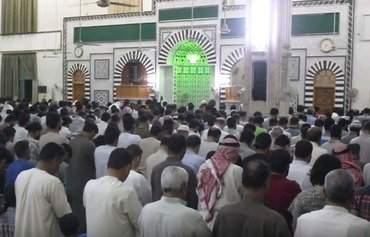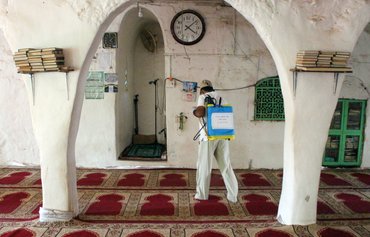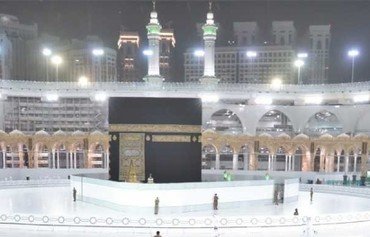A directive issued by the Houthis (Ansarallah) to silence loudspeakers broadcasting the Taraweeh and Qiyam al-Layl prayers during Ramadan is not just oppressive, analysts and clerics tell Al-Mashareq -- it is hypocritical.
While the Houthi-affiliated Ministry of Endowments and Guidance has banned mosque loudspeakers from broadcasting the recitation of these traditional prayers, the militia is using loudspeakers to spread its own messages, they said.
The ministry issued its directive to silence Sanaa mosque loudspeakers during the recitation of Taraweeh and Qiyam prayers in a circular, ordering the directors of Endowments and Guidance offices in other provinces to enforce it.
In a number of Sanaa mosques, imams told Al-Mashareq that silencing the mosque loudspeakers has stripped Ramadan of its atmosphere and spirituality.
![Houthis watch a live speech given by leader Abdul-Malik al-Houthi on a big-screen TV during a November 30th rally in Sanaa. While the Houthis have banned mosque loudspeakers from broadcasting the Taraweeh prayers during Ramadan, critics point to events like this, saying the decree is hypocritical. [Mohammed Huwais/AFP]](/cnmi_am/images/2018/06/11/12997-Sanaa-Houthi-screen-600_384.jpg)
Houthis watch a live speech given by leader Abdul-Malik al-Houthi on a big-screen TV during a November 30th rally in Sanaa. While the Houthis have banned mosque loudspeakers from broadcasting the Taraweeh prayers during Ramadan, critics point to events like this, saying the decree is hypocritical. [Mohammed Huwais/AFP]
The sound of prayer used to permeate the city from end to end.
Mohammed Ahmed, a former preacher at a Sanaa mosque, told Al-Mashareq the Houthis replaced him with a preacher affiliated with the Iran-backed militia.
In addition to banning the use of loudspeakers in the mosque, he said, the Houthis banned the recitation of Taraweeh prayers.
"The silencing of loudspeakers in mosques ... during the month of Ramadan is directed at mosques whose imams are still from outside the group," Ahmed said.
'Ramadan this year is different'
"Ramadan this year is different from all previous years," said Mohammed Ali, imam and preacher at a mosque where the Taraweeh and Qiyam prayers have been held for years.
This is due to "the silencing of loudspeakers, through which we used to deliver the message to worshipers who could not get into the mosque because of how crowded it gets", he told Al-Mashareq.
"There are those who come to the mosque to report to the group on the activities that take place in it, and whether they are in compliance with their directives," Ali said.
"This is concerning for us, seeing as a number of preachers have been arrested for non-compliance," he added.
Ali noted the hypocrisy of the Houthis’ ban of the use of loudspeakers in mosques, "while at the same time they use them in their centres that proliferate in all districts and atop roaming cars to broadcast their [leader's] sermons".
'A doctrinal stance by the Houthis'
The ban on loudspeakers "is a doctrinal stance by the Houthi group", rights activist Abdel Rahman Berman told Al-Mashareq.
"Mosques that were under Houthi control before their coup against the state banned Taraweeh prayers, as happened in Saada province years ago," he said.
The Houthis seek "to impose their doctrine by force and abolish any manifestation of any other doctrine", Berman said, noting that the group does not support religious co-existence.
This is why it has banned Taraweeh prayers, he said.
Berman said the Houthis were founded on a narrow partisan platform that seeks to impose its own doctrine, which has caused many problems in Sanaa over the years, as the Houthis sought to ban Taraweeh prayers even under the state.
"The Houthis do not believe in others," writer and political analyst Rashad al-Sharaabi told Al-Mashareq.
"They believe that Taraweeh prayers are unimportant and are a heresy of the Sunnis, with whom they disagree [on doctrinal grounds], so they ban them in mosques for no reason other than doctrinal differences," he said.
They may frame the loudspeaker ban as preventing public disturbance, he said, but their own loudspeakers "blare from their mosques and from atop their moral guidance and military information vehicles, disturbing the public day and night".

![Yemenis perform Taraweeh prayers at the Amna mosque in Beyt Baws village in Sanaa during Ramadan 2018. [Abu Bakr al-Yamani/Al-Mashareq]](/cnmi_am/images/2018/06/11/13018-yemen-loudspeakers-600_384.jpg)







These are lies and fraud; they’re the biggest source of disturbance through loudspeakers before the Houthis. They would pray and chant religious slogans for long! How do they prevent loudspeakers?! This is part of the sectarian war.
Reply1 Comment(s)